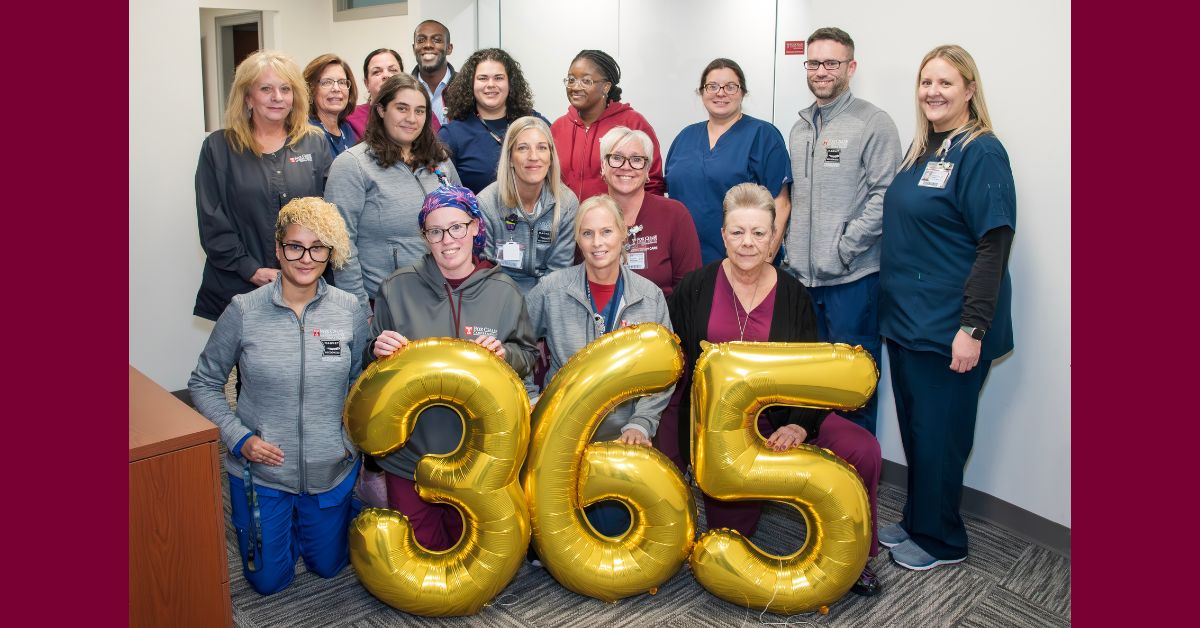
PHILADELPHIA (December 21, 2023) —On November 8, 2023, the entire team at Fox Chase Cancer Center’s Huntingdon Pike ambulatory care clinic celebrated 365 days of successfully preventing patient falls. While falls were never common at HP, the nursing staff developed a home-grown recipe for fall prevention that included both new procedures and an overall dedication to finding and eliminating potential hazards. As a result, they have gone fall-free for an entire year.
“Preventing falls in any type of clinical setting is a high priority – one fall is just too many,” said Rebecca Farrell, MSN, RN, AGCNS, NEA-BC, Clinical Manager, Ambulatory Care HP. “We see about 180 outpatient Urology and Dermatology patients each day, and our patients tend to be on the older side and more susceptible to the risks of falling, especially if they leave their walkers at the door.”
Creating a No Falls Culture
According to Farrell, some of the protocols in place for inpatient fall prevention – such as non-skid socks and yellow wristbands – are not really part of the procedure for outpatient visits. Instead, the team developed a “yellow card system,” of laminated yellow cards that could be hung discretely on examination rooms of patients deemed at risk.
Of course, a yellow warning card only goes so far if you don’t address some of the other underlying issues, from the facility to the patients themselves. The staff became mindful of patient pathways, notably where the floor transitioned from one material to another, as well as any potential obstacles. Since most falls occur on the way to – or inside – bathrooms, they asked facilities staff to replace older toilets with taller ones and to add more hand-holds. They even took notice of patient clothing – particularly shoes – that might pose a tripping hazard in the clinic, offering to help carry a coat or tie a shoe more firmly when needed.
In time, a No Falls Culture began to develop within the team, and it became routine to scrutinize every moment of patient interaction. A case in point was the decision on where to put new call bells in patient rooms, deciding that the standard “behind-the-bed approach” was too risky for patients reaching behind the back of an exam table for the pull cord. Instead, they put them alongside the table where it was easier to see and grab. It was a consideration they might not have thought about previously, but the No Falls Culture empowers everyone to take responsibility.
“This is all due to one nurse, Lillian, who pulled me aside after a staff meeting one day and asked to take on the issue of patient falls,” Farrell said. “Of course, I told her to go for it, and she immediately began brainstorming ideas, including the yellow cards and the brilliant idea of enlisting the front desk staff.”
From the Moment They Enter
“The front desk is really the first line of identifying fall risk, and it doesn’t take a lot of training to spot who might be less steady on their feet,” said Lillian Walsh, BSN, RN, OCN. “It is easy to slip a yellow card into a patient folder without them noticing, and there is no harm in overusing it.”
According to Walsh, it was trial and error at first, but the registration desk staff got the hang of it. They can often tell who might have walked in the door on the arm of a caregiver or who may have set their walker or cane aside. In particular, the registration staff became skilled at adding a yellow card without the patient noticing, so as to avoid embarrassment.
While the EPIC registration system had a note for fall risk for inpatient charts by default, IT was able to add it to the outpatient registration for Huntingdon Pike.
“We let everyone know that this was something we were all working on improving in the clinic, and not just adding an extra task that could be ignored if things got busy,” Walsh said. “Now, we all hold each other accountable, and it has been added to the staff orientation at HP.”
Since beginning the program, Walsh has moved to the outpatient clinic at Fox Chase’s main campus, where she looks to continue championing fall prevention. The layout of the cancer center, of course, is much more complex than Fox Chase’s Huntingdon Pike facility, with multiple locations for registration and points of entry for the hospital. Now, says Walsh, she’s working with nursing leadership to identify some fall prevention tactics they can begin to pilot within the clinics.
“The nursing staff at Huntingdon Pike have transformed how they approach patient falls, and the results speak for themselves,” said Kathleen Wolf, MBA, BSN, RN, NEA-BC, Director of Magnet and Nursing Quality at Fox Chase. “I’m glad Lillian has initiated this improvement initiative and I am grateful to the team at HP for leading the way.”